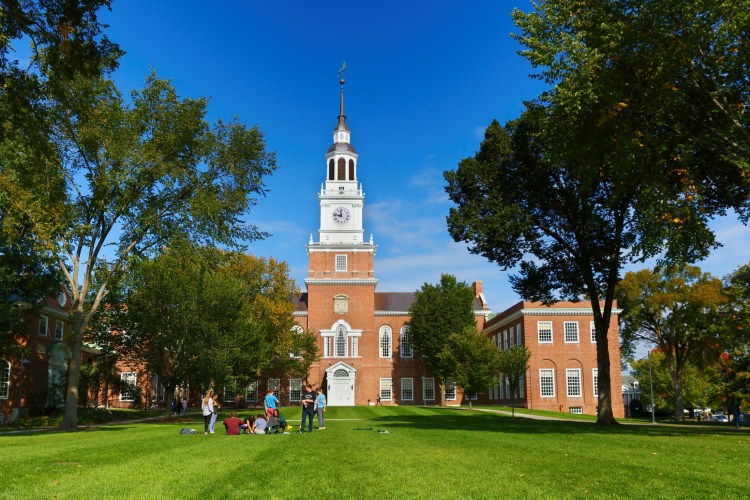HANOVER, N.H. — When Matthew Garcia’s “Food History” class set out to document the history of agriculture at Dartmouth College, they got wind of a long-circulating tale about cows grazing on the college green in its early days.
“Then we were in hot pursuit of evidence,” Garcia said last week, standing in the library beside a lifesize model of a Holstein scrawled with notes and signatures, at the edge of the new student-created exhibit.
Digging through school archives, not only did students confirm that cows roamed the green in the 1800s, they discovered that the docile bovines provoked such ire among students, at one point there was a plot to tar and feather them.
Such has been the ambivalent relationship between the Ivy League institution and the farms scattered along its edges over the years. The new exhibit, which is on display now through the middle of June in the college’s Baker-Berry Library, reveals the connections between the college and the agricultural community from those first unwelcome cows some 200 years ago to current efforts to understand farming at the local level.
Presented in text and photos on large panels in the Berry Brickway Gallery – a heavily trafficked corridor that leads to the student cafe – the exhibit highlights the early days of the college, when agriculture was its most popular major, the installation of Victory Gardens at Occom Pond during World War II, the birth of the school’s own organic farm in 1996 and the recent inception of a class that connects students with area dairy farms to teach migrant workers English.
Sunpreet Singh, a junior from Queens, New York, who was in both Garcia’s class and a class called “Migrant Lives and Labor in the Upper Valley” this spring, said the experience of participating in the agricultural community and documenting the work has been eye-opening.
“At Dartmouth, we live in a bubble. I think using our resources and privileges to help (migrant workers) is what this class is all about,” he said.
Doug Moody, who teaches in Dartmouth’s Latin American, Latino and Caribbean Studies program, created the migrant lives class in 2016 as a way of giving students real-world experience while getting them involved in an issue that’s critical to the region and connected to numerous disciplines.
“Across the country, not just Vermont and New Hampshire, there are migrant farm workers that have taken the jobs that Americans don’t want,” he said. “Basically, the industry would not function without this migrant labor pool.”
That’s especially true of the dairy industry, the bedrock of Vermont agriculture, which relies on year-round workers. “That’s the conundrum of our immigration system,” Moody said. “We need these workers, and there’s not a renewable visa program that would allow them to work year-round.”
For both documented and undocumented workers, English instruction provides a critical tool for functioning in the community and empowers them to advocate for themselves, said David Ramirez, a senior from Hammonton, New Jersey, who was in Moody’s first migrant lives class and helped found a program called FUERZA that maintains a year-round connection between students and migrant workers. “Even when they go to the grocery stores, they’ve confronted with a language barrier,” he said.
Ajaipal Chahal, a junior from Santa Clara, Caliornia, who was in Garcia’s class and helped create the exhibit, said it’s important for people to understand how our food system affects the people who work within it. “We wanted to push people to try to understand what’s behind their food,” said Chahal, who, with Singh, also created a podcast for Garcia’s class about the migrant workers and the issues they face.
Garcia, who planned the exhibit as well as a panel discussion that brought farmers, scholars and community members to the college in April, believes Dartmouth has a responsibility to engage with the farming community, in light of its importance to the region. As he wrapped up the last day of food history class last week, Garcia encouraged students to continue challenging the college to support local farms and social justice.
“Dartmouth can keep doing these things, can keep supporting these things, but it really takes you,” he said.
Send questions/comments to the editors.



Success. Please wait for the page to reload. If the page does not reload within 5 seconds, please refresh the page.
Enter your email and password to access comments.
Hi, to comment on stories you must . This profile is in addition to your subscription and website login.
Already have a commenting profile? .
Invalid username/password.
Please check your email to confirm and complete your registration.
Only subscribers are eligible to post comments. Please subscribe or login first for digital access. Here’s why.
Use the form below to reset your password. When you've submitted your account email, we will send an email with a reset code.